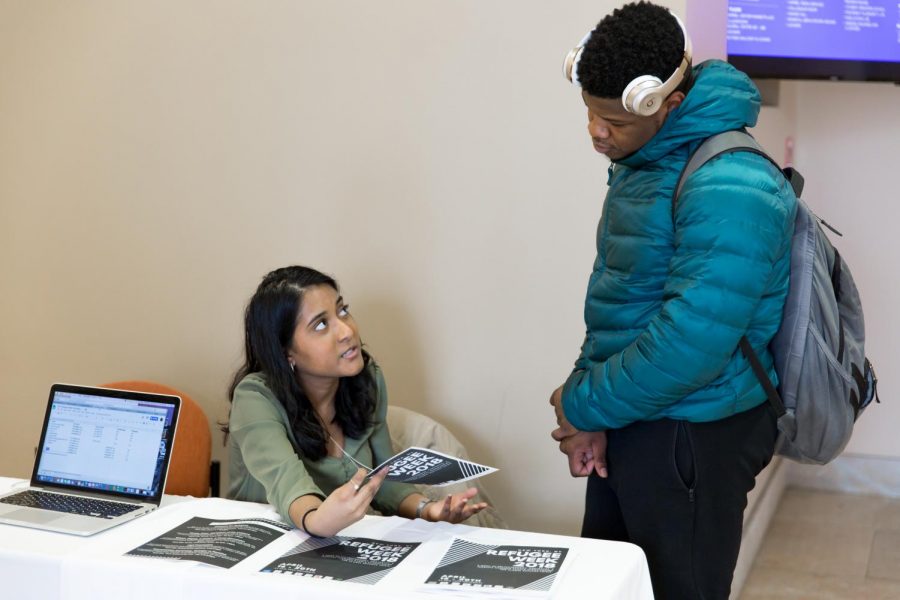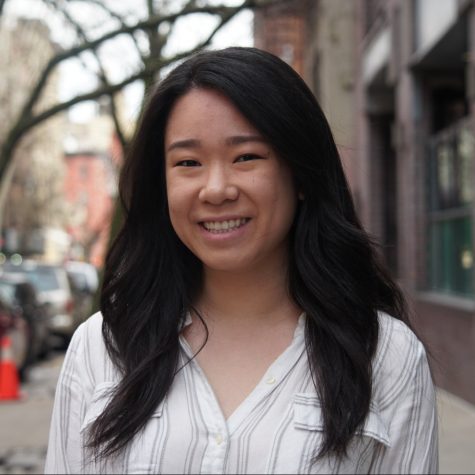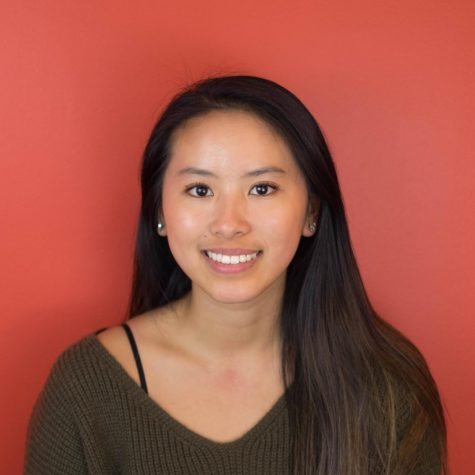Students Raise Awareness on Refugee Crisis
An NYU Student tables for Refugee Week 2018.
April 16, 2018
The global refugee crisis often feels like it’s happening a million miles away, on another planet. But it’s not.
A group of NYU students learned this first hand while working with refugees in Berlin, Germany over spring break. After this eye-opening service trip, four of the students decided to organize a series of events to bring enlightenment to the NYU community on topics regarding migration, human rights violations and identity.
Previously known as Syrian Refugee Awareness Week, Refugee Week will consist of five events from April 16-20. There will be panel discussions, a poetry slam, a vigil procession and a documentary screening of “Stranger in Paradise.” For the panel, the organizers were able to secure distinguished speakers like Mayor Mohamed Khairullah and Kwame A. Appiah, who was named one of the world’s most powerful thinkers by Forbes.
“We took this task on last-minute, following our trip to Berlin,” said Mohammed Ali Hojaij, a Gallatin sophomore and the director of events and organization for Refugee Week.
“We changed the name to Refugee Week to encompass those who are underrepresented in the global refugee crisis.”
Hojaij and the three other student organizers of Refugee Week felt inspired to spread awareness about refugee experiences after returning from Berlin, where they worked with organizations such as Moabit Hilft, One World Basketball and Give Something Back to Berlin. These non-profits help displaced migrants, refugees and immigrants from war-torn countries settle into their new homes.
“[The trip] really made me think about my position here, in a secure country that provides so many resources and institutions for our use,” Hojaij said. “We never feel threatened as if we might lose our homes tomorrow, or lose a family member, or quit school or take up arms in the army. We don’t feel this.”
While Hojaij acknowledges that those who haven’t experience it will never truly understand the traumatic and heartbreaking experiences of refugees, he hopes the events generate thought-provoking conversation.
“We just hope to bring the conversation here to NYU, to make people aware and inspire them to take action,” Hojaij said. “Through discussions, through our amazing speakers, we hope to translate some sort of knowledge, some sort of experience, some sort of narrative to others so that they’re able to understand.”
In preparation for Refugee Week, the team reached out to speakers, created a social media presence and connected with on-campus organizations like Model United Nations, UNICEF and Mosaic. According to Hojaij, these groups have been incredibly helpful in promoting their events and supporting with volunteers. With the help of these organizations, Hojaij hopes to establish Refugee Week as an annual event.
Outreach Coordinator and LS first-year Aya Ouda looks forward to seeing their vision for Refugee Week come to life, especially after the countless hours of planning. She can’t wait to hear the opinions and narratives of NYU students at the slam poetry event, which she organized.
“I’m going to be performing a poem about one of the refugees I met in Berlin,” Ouda said. “Something that the refugees really emphasized when they were speaking with me was how I can help. I asked them, ‘What can we do to help from America?’ and they said, ‘Tell our story.’”
The team really took this concept to heart when organizing their events. Both the student panel on Monday and the “Ethics, Rights and Duties” panel on Wednesday will use refugee stories to create discussion.
Steinhardt senior Sarah Yunus, one of the outreach coordinators, is looking forward to hearing from student speakers at the first event, many of whom are leaders in on-campus clubs and advocacy groups that work to bring awareness to and aid the refugee crisis.
“It’s exciting to hear those voices because it can encourage others students to do their part,” Yunus said.
The organizers hope participants in the events leave with a more whole picture of the refugee crisis and a desire to get involved. For Yunus, it’s essential for people, as global citizens, to understand their roles in international issues like this.
“In Germany, they’re one of the only countries in Europe that takes in so many refugees,” Yunus said. “Whereas in the United States, we don’t take in as many refugees as others. It’s just something to think about. What are we doing? What’s our role? How are we helping this crisis?”
For this small group of organizers, Refugee Week’s role is to help bring humanity to a crisis that may seem distant to us.
“When we think about refugees, we don’t really think about the people behind that word,” Ouda said. “It was very awakening to hear these people’s stories and their lives outside of being a refugee.”
A version of this article appeared in the Monday, April 16 print edition. Email Natalie Chinn at [email protected].


























































































































































